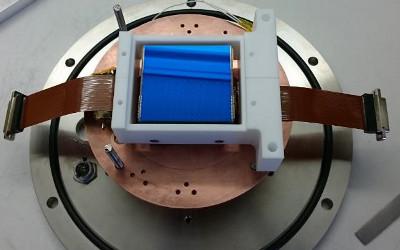UK Space Agency extends funding for OU space imaging project

The UK Space Agency (UKSA) has signalled its commitment to OU space research by increasing its funding for a pioneering space imaging project by more than £287,000. The grant adds to the £114,000 the agency invested in the project in 2021.
The project continues research The OU’s Centre for Electronic Imaging (CEI) has been doing since 2008 to develop and test image sensor technologies for the European Space Agency’s (ESA) latest space telescope, Euclid, which will launch in 2023. Euclid’s Visible Instrument (VIS) will map the Universe’s geometry, dark energy and dark matter. Protecting it from the harsh space environment, where colliding with high-energy protons hurtling close to the speed of light can knock silicon sensors’ atoms out of place, is vital. These misaligned atoms temporarily ‘trap’ the signals the sensors generate before releasing them later, leading to images that appear heavily smeared.
The latest funding will progress the development of a pioneering new technique called ‘trap pumping’. This method involves shuffling signals back and forth thousands of times - at just the right speed - to measure when ‘traps’ in damaged silicon sensors release the captured signal and clean up smeared images back in the lab, locating the position of the damage accurately to within a few thousandths of a millimetre.
CEI Research Fellow Dr Jesper Skottfelt will lead this project with Detector Simulation Scientist Dr Zoe Lee-Payne, Space Research Software Engineer Matt Wander, Senior Lecturer David Hall and Project Manager Tim Arnold.
Dr Skottfelt said: “On sensitive devices such as the ones used for the VIS instrument on the ESA's Euclid mission, radiation damage can massively distort images. In some cases, this effect can be 300 times larger than the effect we are trying to measure, making it impossible to do science.
“The correction required for Euclid needs to be 100 times better than that currently used for Hubble, which means our innovative trap pumping technique will be vital to ensure the accuracy of the images it beams back to Earth.
“The latest funding is a welcome demonstration of UKSA’s confidence in the CEI team’s space imaging capabilities and will enable us to continue this pioneering work.”
Quarterly Review of Research
Read our Quarterly Review of Research to learn about our latest quality academic output.

Contact our news team
For all out of hours enquiries, please telephone +44 (0)7901 515891
Contact details